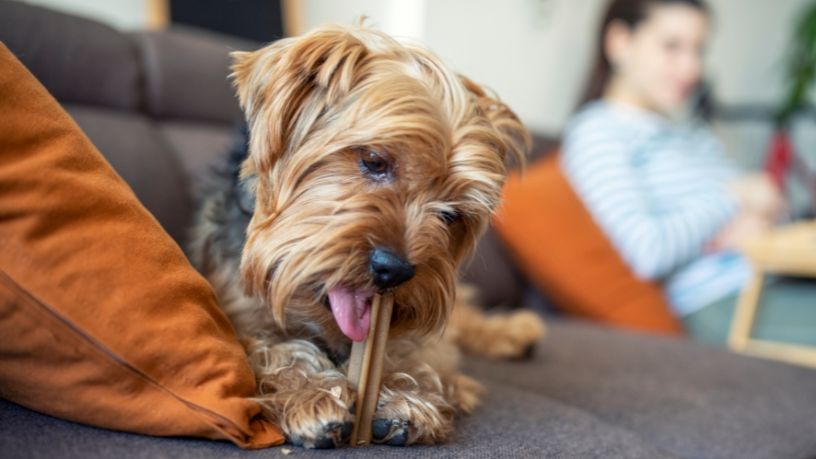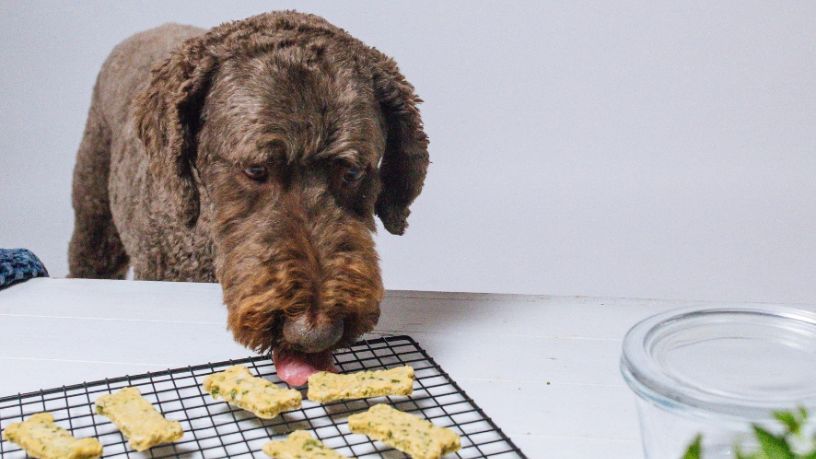Dogs cannot eat a lot of the food we can. Always check to make sure the food you’re offering your pet isn’t toxic to their system.
Key takeaways
While some fruit flesh and peel are okay, their pits and seeds may be poisonous to dogs.
If your dog has eaten something it shouldn’t have, see a vet immediately.
While we might love our fur babies just as much as the people in our lives, responsible owners need to remember that dogs are not human, and they can’t eat a lot of the foods that we find delicious.
In fact, some of our favourite treats can be harmful and even lethal to our canine companions. We’ve put together a list of common foods and ingredients which are toxic for dogs to help you keep them safe and healthy.
Toxic foods
1. Chocolate
Chocolate (or, more specifically, the chemical theobromine) is a big no-no when it comes to your dog. Theobromine, found in dark, milk and white chocolate, is known to speed dogs’ heart rates and stimulate their nervous systems.1
If your dog eats chocolate, they may experience:
- vomiting and diarrhoea
- panting
- excessive thirst and urination
- hyperactivity
- abnormal heart rhythm
- tremors, seizures and even death.
The higher the cocoa content the more dangerous it is to your pup, as it contains a higher concentration of theobromine as well as containing caffeine, which is also harmful for dogs.2
2. Grapes, sultanas, raisins and currants
There are plenty of fruits you can share with your pooch, but grapes aren’t one of them. Grapes and their dried variations, such as sultanas, raisins and currants, are poisonous for dogs and can cause vomiting, sluggishness and even kidney failure, which can be fatal.3
3. Avocado
Avocado contains a chemical called persin, which is safe for humans but toxic for dogs. In dogs it can cause an upset stomach, vomiting and diarrhoea. In some cases, the reaction is much more severe and persin may cause fluid to accumulate in your dog’s heart, pancreas, abdomen or lungs and chest. This prevents breathing and leads to oxygen deprivation and even death.
Be aware that persin is not only in the fruit of the avocado, but also the pit, leaves and bark, so keep your pup away from the whole plant.4
4. Onion and garlic
The onion family (which includes garlic, chives, shallots and scallions) is particularly nasty on a canine body as these foods can damage your pup’s red blood cells and cause anaemia.3
Garlic is considered 5 times more potent than onions, so keep your dog well clear. It’s also important to note that signs of garlic or onion poisoning (such as lethargy, weakness and orange or dark red urine) often don’t appear for several days, so if you think your dog has eaten any of these foods, keep a close eye on them.
5. Citrus fruits
Citric acid, which is found in the fruit, seeds, peel, leaves and stems of citrus plants like oranges, lemons, mandarins and grapefruit, can cause an upset stomach if ingested in small amounts. However, if your doggo eats a lot of it, it can wreak havoc with their central nervous system, so avoid at all costs.5
6. Peaches and plums
While small amounts of the flesh should be fine, stone fruit such as peaches, plums, apricots and even cherries can cause problems due to the cyanide content of their pits. The larger pits can also present a choking and digestive hazard.6
7. Macadamia nuts
Macadamia nuts are some of the most poisonous foods for dogs. Consumption can cause weakness, vomiting, tremors, lack of co-ordination, increased body temperature, inability to walk, lethargy and paralysis.7
8. Alcohol
We hope this one goes without saying, but don’t give your dog alcohol. Even small amounts, such as those found in syrups and raw bread dough can be poisonous to your canine friend. Alcohol poisoning may cause breathing difficulty, lung failure, seizures and tremors, coma, and even death.8
9. Cooked bones
While not poisonous, cooked bones are potentially lethal to dogs as they can splinter and block or perforate your dog's intestines. As for raw bones, the RSPCA says they are okay as long as they are “at least wider than the width of your three middle fingers” as a general guide.3
10. Xylitol
Xylitol is a natural sweetener often found in chewing gum, lollies and mints, baked goods, peanut butter and chewable or gummy vitamins.
While it’s safe for humans, it’s toxic for dogs. Even a small amount may cause hypoglycaemia (low blood sugar), seizures, liver failure or even death.9
11. Coffee and tea
The caffeine in coffee and tea (not to mention many soft drinks and chocolate) is bad news for your pooch, making them restless and causing muscle twitches, fast breathing, excessive thirst, loss of bladder control, vomiting and diarrhoea at best. At worst? You’re looking at possible lung failure, abnormal heart rhythm and even death.2
12. Salt
A high-sodium diet isn’t good for us or our 4-legged pals, but for them, too much can cause excessive thirst, water deprivation and even sodium ion poisoning, which can lead to neurological disorders, cerebral oedema, vomiting, diarrhoea, fever and seizures. Avoid sharing salty snacks like chips and pretzels with your pooch.10
13. Apple seeds
Dogs love apple and it’s good for them, too, but make sure you cut it up and remove seeds before you give it to your pooch. Like stone fruit, apple seeds contain poisonous cyanide that is toxic in dogs.11
14. Yeast
If you’re baking bread, be sure to keep your dog away from the uncooked dough. As the yeast ferments, it produces alcohol (ethanol), which can poison your pup. As the dough expands, it can also cause the stomach to severely bloat and twist, causing pain, tissue damage and breathing difficulties.12
What to do if your dog eats something toxic
Dogs are masters of sneaking snacks and sampling food from the floor. Sometimes, despite our best efforts, they manage to get their mouths on things they shouldn’t. If you discover or suspect your dog has eaten something that might be toxic, contact your vet immediately.

At Bupa, trust is everything
Our health and wellbeing information is regularly reviewed and maintained by a team of healthcare experts, to ensure its relevancy and accuracy. Everyone's health journey is unique and health outcomes vary from person to person.
This content is not a replacement for personalised and specific medical, healthcare, or other professional advice. If you have concerns about your health, see your doctor or other health professional.
1RSPCA. (2022). Why is chocolate toxic to dogs and other animals?. RSPCA.
2Pet Poison Helpline. (2011). Is caffeine poisonous to dogs?. Pet Poison Helpline.
3RSPCA. (2018). 10 human foods you definitely shouldn’t feed your dog (and what to give them instead). RSPCA.
4Battersea. (2023). Toxic food for dogs. Battersea.
5ASPCA. (2024). People Foods to Avoid Feeding Your Pets. ASPCA.
6Reisen, J. (2021). Can dogs eat peaches?. American Kennel Club.
7American Kennel Club. (2024). People foods dogs can and can’t eat. American Kennel Club.
8Pet Poison Helpline. (2024). What happens if my dog drank alcohol?. Pet Poison Helpline.
9U.S. Food and Drug Administration. (2023). Paws Off Xylitol; It's Dangerous for Dogs. U.S. Food and Drug Administration.
10Thompson, L. J. (2022). Salt Toxicosis in Animals. MSD Manual: Veterinary Manual.
11ASPCA. (2024). Toxic and non-toxic plants: Apple. ASPCA.
12Pet Poison Helpline. (2024). Bread dough. Pet Poison Helpline.
You might also like...
10 ways dogs boost our mental health
Find out how dogs boost our mental and physical health by encouraging activity and social connections, and offering companionship and unconditional love.
The best food and treats for your dog's dental health
Even dogs don’t like going to the dentist. The good news is you can protect their teeth and gums between check-ups with some of their favourite foods.
Common puppy emergencies and what to do when they happen
Puppies are plenty of fun, but sometimes they get into trouble and may need a to visit a vet. Get familiar with some common puppy emergencies here.
Chicken chews for your dog
Looking for a scrumptious homemade treat to keep your dog (and their teeth) busy? Check out our chicken dog chew recipe.





